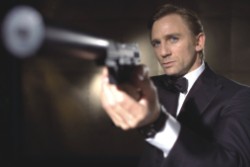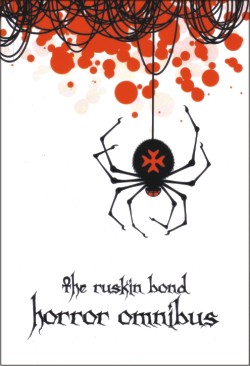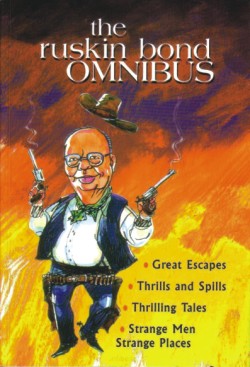Impressions
From James Bond
to Ruskin Bond
Abdus Selim
I first read James Bond, that is, Ian Fleming, when I was a student of intermediate arts (now higher secondary) during the early 60s of the last millennium. Fleming was introduced to me by my father along with Jules Verne, Sir Arthur Conan Doyle, Agatha Christie and Perry Mason; and because of my tender age romanticism as well as inquisitiveness James Bond instantly became my idol. I had nothing in common with this thriller character--neither mental nor physical--but as it always happens, being a youth of 16, I too tried to look for a person of worship who was really strong and spectacular. Moreover, Bond being very crafty and expert in making all the beautiful girls he usually came in contact with to fall for him was another attraction for me at that age; and of course the additional lure was the description of sexual encounters of Bond. So, that was how I came to know James Bond.
After 48 years, I was again introduced to another Bond by one of my favourite postgraduate students. He is not a fictional secret agent but a creative writer in flesh and blood from India--an Anglo-Indian by birth--who never likes to show himself off and whose works apparently--I say apparently purposefully though--are not comparable with Ian Fleming's. Commenting on Ruskin Bond Naipaul in one of his interviews once said, “I have read nothing like that (he actually refers to Bond's autobiography) from India or anywhere else. It's very simple. Everything is underplayed, and the truths of the book come rather slowly at you. He is writing about solitude, tremendous solitude. He himself does not say it. He leaves it all to you to pick up.”
 |
Ruskin Bond |
One can legitimately ask me how come I compare an imaginary thriller character with a real life writer, and I am readily and unconditionally apologetic to my readers for that. But I wish to see these two incidences of my being introduced to two Bonds at two different junctures of my life on a par, for both of them were really exciting revelations to me. Furthermore, I wish to justify that James Bond as a character stood out to be a living man in flesh and blood to all of us during Fleming's lifetime and it still remains so--Bond is much more a known and admired name than his creator. The other reason why I wish to compare these two Bonds is, in my recent reading of James Bond--when my interest in hero-worship, romanticism and curiosities about physical pleasures have settled down to a rational level--I have discovered that Ian Fleming too had wonderful literary potential that very few creative writers possessed. This has endorsement by many critics of the recent time that hold that Ian Fleming was the man with the golden pen. Even a poet like Kingsley Amis, it is said, once tried his hand in writing a James Bond story. His son, Martin Amis in an interview on Radio 4 said his father completed the first “continuation Bond” in 1965 (Fleming died in 1964) after he divorced his mother, adding though, “After he divorced my mother, Kingley was so churned up emotionally that he couldn't write anything more serious than James Bond.”
 Ben Macintyre wrote in the Times magazine of July 13, 2007 issue,“…nearly a century after Fleming's birth, and more than half a century after he sat down to write, Bond remains a literary landmark of the modern age. So far from being mere adventure stories, the Bond books created an entire fictional world around a single individual, as enduring and rich as those of Sherlock Holmes or Bertie Wooster.” Ben Macintyre wrote in the Times magazine of July 13, 2007 issue,“…nearly a century after Fleming's birth, and more than half a century after he sat down to write, Bond remains a literary landmark of the modern age. So far from being mere adventure stories, the Bond books created an entire fictional world around a single individual, as enduring and rich as those of Sherlock Holmes or Bertie Wooster.”
I would like to endorse Ben's views by quoting three excerpts from three extremely popular Fleming thrillers, Dr. No; From Russia, With Love; and Thunderball, which will undoubtedly display his literary and creative power. Dr. No opens with the following paragraph that has only one sentence showing how discreetly and succinctly Fleming uses his language: “Punctually at six o'clock the sun set with a last yellow flash behind the Blue Mountains, a wave of violet shadow poured down Richmond Road, and the crickets and tree frogs in the fine gardens began to zing and tinkle.” That Fleming had a deep affinity with the ambiance of a place can be easily established from any of his works, one more that I have within easy reach is from Thunderball: “Far below, where the dancing moon shadows could not penetrate, the bottom was even white sand with an occasional dark patch that would be seagrass. All around there was nothing but the great pale luminous hall of the sea at night, a vast lonely mist…”
The third quotation is from, From Russia, With Love, which to me appears to be a wonderful analysis of human psychology: “Tatiana walked to the door. She switched off the top light. Her hand dropped decisively to the door knob. She turned it and opened the door and stepped coolly out into the corridor. Suddenly her nerve broke. She banged the door shut behind her and ran wildly off down the corridor with her hands over her ears against the pursuing scream that never came.”
 But I was definitely not caught by Fleming's literary creativity when I had first read him at sixteen--it was actually the excitement of reading a thriller added with the charisma and clout of James Bond himself that had attracted me so much then. I became interested to explore his talent in fiction writing when in answer to a query from my above mentioned student I confessed naively that though I heard the name of Ruskin Bond, I never had the opportunity to read any of his short stories, novels, poems, or journals. She was really shocked for she loved reading Ruskin to which I answered I once was in love with James, James Bond. I utterly disappointed her by comparing Ruskin Bond with James Bond and promptly, within a span of four days time she brought me four of Ruskin Bond's works directly from her shelf and nagged me to read all of them in no time. I don't regret this reading and I don't regret my comparing two Bonds either, for both of them proved to be rewarding. But I was definitely not caught by Fleming's literary creativity when I had first read him at sixteen--it was actually the excitement of reading a thriller added with the charisma and clout of James Bond himself that had attracted me so much then. I became interested to explore his talent in fiction writing when in answer to a query from my above mentioned student I confessed naively that though I heard the name of Ruskin Bond, I never had the opportunity to read any of his short stories, novels, poems, or journals. She was really shocked for she loved reading Ruskin to which I answered I once was in love with James, James Bond. I utterly disappointed her by comparing Ruskin Bond with James Bond and promptly, within a span of four days time she brought me four of Ruskin Bond's works directly from her shelf and nagged me to read all of them in no time. I don't regret this reading and I don't regret my comparing two Bonds either, for both of them proved to be rewarding.
Ruskin Bond was born in India in 1934. In the blurb of his Rusty serial stories titled Rusty Goes to London it says, “For over forty-five years Ruskin Bond has been writing stories, novellas, essays, poems and children's books. He has written over 500 short stories and articles, many of which have been published by Penguin India.” Perhaps that was the reason why my student could not accept the fact that I had not had the opportunity to read Ruskin before she actually persuaded me to go through three of his books at a time. But what is special about him?
To quote Ruskin himself, which I feel is the correct self-assessment, “People often ask me why my style is so simple. It is, in fact, deceptively simple, for no two sentences are really alike. It is clarity that I am striving to attain, not simplicity…Of course some people want literature to be difficult. And there are writers who like to make their readers toil and sweat.” But Ruskin does not want his readers to “toil and sweat”, and truly so. For example most of his poems read like the following:
 Trees of God, we call them; Trees of God, we call them;
Planted here when the world was young,
The first trees
Their fingers pointing to the stars,
Older than the cedars of Lebanon.
They cut them down last spring
With swift efficient tools,
The sap was rising still.
The trees bled,
Slaughtered
To make furniture for fools. (These I Have Loved)
Or
Like the wind, I run;
Like the rain, I sing;
Like the leaves, I dance;
Like the earth, I'm still;
And in this, Lord, I do thy will. (The Wind and the Rain)
As for his prose I have the following excerpts from The Man Who Was Kipling:
“I was sitting on a bench in the Indian Section of the Victoria Albert Museum in London, when a tall, stooping, elderly gentleman sat down beside me. I gave him a quick glance, noting his swarthy features, heavy moustache, and horn-rimmed spectacles. There was something familiar and disturbing about his face, and I couldn't resist looking at him again.” In fact, the elderly gentleman was Rudyard Kipling's ghost and the final lines of the short story reads like this, “I left the museum, and wondered about the streets for a long time, but I couldn't find Kipling anywhere. Was it the boom of London's traffic that I heard, or the boom of the Sutlej river racing through the valleys?” The story perhaps explains why Ruskin once wanted to go back to his ancestral home that is England, but failed to adjust and finally came back to India to settle permanently in Mussoorie, under the Himalayans. Both Ruskin and Fleming have love for their birthplaces and empathy for nature, though as writers they stand at two diametrically opposite poles.
I have found one more thing very admirable in Ruskin. It is from his journal Landour Days where in giving advice to budding writers he appropriately said, “Are you prepared to wait years, may be a lifetime, for recognition? If you want instant recognition, become a model (instead of a writer)?"
Abdus Selim is Assistant Professor, English Department, North South University.
Web Developed by: Kazi Ziaur Rahman
Copyright
(R) thedailystar.net 2009 |
